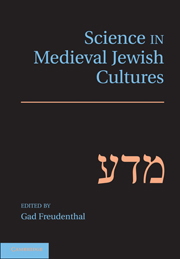Book contents
- Frontmatter
- Contents
- Contributors
- Preface and Acknowledgments
- Introduction: The History of Science in Medieval Jewish Cultures
- Part I The Greek-Arabic Scientific Tradition and Its Appropriation, Adaptation, and Development in Medieval Jewish Cultures, East and West
- 1 The Assimilation of Greco-Arabic Learning by Medieval Jewish Cultures
- 2 Medieval Hebrew Translations of Philosophical and Scientific Texts
- 3 Arabic and Latin Cultures as Resources for the Hebrew Translation Movement
- 4 The Production of Hebrew Scientific Books According to Dated Medieval Manuscripts
- Part II Individual Sciences as Studied and Practiced by Medieval Jews
- Part III Scientific Knowledge in Context
- Name Index*
- Subject Index*
- References
4 - The Production of Hebrew Scientific Books According to Dated Medieval Manuscripts
from Part I - The Greek-Arabic Scientific Tradition and Its Appropriation, Adaptation, and Development in Medieval Jewish Cultures, East and West
Published online by Cambridge University Press: 05 June 2012
- Frontmatter
- Contents
- Contributors
- Preface and Acknowledgments
- Introduction: The History of Science in Medieval Jewish Cultures
- Part I The Greek-Arabic Scientific Tradition and Its Appropriation, Adaptation, and Development in Medieval Jewish Cultures, East and West
- 1 The Assimilation of Greco-Arabic Learning by Medieval Jewish Cultures
- 2 Medieval Hebrew Translations of Philosophical and Scientific Texts
- 3 Arabic and Latin Cultures as Resources for the Hebrew Translation Movement
- 4 The Production of Hebrew Scientific Books According to Dated Medieval Manuscripts
- Part II Individual Sciences as Studied and Practiced by Medieval Jews
- Part III Scientific Knowledge in Context
- Name Index*
- Subject Index*
- References
Summary
The most reliable and accurate way to unveil the extent of scientific scholarship and readership among the Jews, principally during the High Middle Ages, is to employ a material approach. The extant medieval Hebrew codices – all manuscripts written in Hebrew characters, regardless of the language – and their remains, of which there may be a hundred thousand, provide the only tangible and quantitative evidence of the elusive intellectual activities through time and space. Surveying all extant Hebrew manuscripts and isolating the scientific books can provide us with precise data on the production and use of scientific texts in the various Jewish geocultural areas over the centuries; however, even these data, although constituting the soundest feasible method for discovering the intellectual and social reality, cannot be regarded as ultimate. The surviving medieval codices represent only a small fraction of the Hebrew books produced during the Middle Ages. The random nature of survival and the unknown rate of survival in each area and period would make the data descriptive rather than definitive.
In any case, such an extensive survey would involve an enormous investment that is unfeasible at present, even if we eliminated the tens of thousands of fragments from the Cairo Geniza, in which there were few scientific works anyway. Although most of the manuscripts have been catalogued by the Institute of Microfilmed Hebrew Manuscripts at the Jewish National and University Library in Jerusalem and are available in a computerized catalogue, many of them lack accurate paleographical identification as to when and where they were written; others have not been textually identified.
- Type
- Chapter
- Information
- Science in Medieval Jewish Cultures , pp. 106 - 110Publisher: Cambridge University PressPrint publication year: 2012



